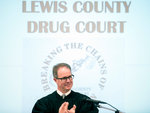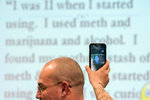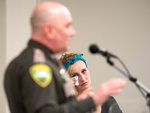







Drug Court isn’t easy, but the rewards are manifold for its most recent graduates.
“Family is everything for me, and I think that is one of the things that a lot of us lose when we’re in our active addiction,” said graduate Christina Lozano.
As she spoke, her young daughter and even younger granddaughter raced around her. Lewis County Drug Court helped Lozano regain custody of her young children and have healthy relationships with her older children and extended family, she said.
Lozano was one of three Lewis County Drug Court participants who celebrated their graduation from the program Monday at the Veterans Memorial Museum, each accompanied by dozens of supporters, mentors and family with whom they have rebuilt relationships once strained after years of drug abuse.
“I’m really honored to be graduating these three,” said Superior Court Judge Andrew Toynbee, participating in his first Drug Court graduation as the judge assigned to the program. “It’s really a celebration.”
The event was held at the Veterans Memorial Museum to accommodate all of the graduates’ friends, family and supporters. Graduations have previously been held at Lewis County Superior Court, the Board of Lewis County Commissioners’ chambers or other locations, Toynbee said.
The graduates were rewarded for their months of grueling work, self-discovery and growth with a document formally dismissing the charges that originally landed them in Drug Court.
But their mentors reminded them — graduation isn’t the end.
“Today is … a commencement,” said Deputy Kevin Dickey, of the Lewis County Sheriff’s Office, who serves as the compliance officer for Drug Court. “You’re not finished. Today you start. You walk out that door. There’s no more pressure. You’re doing it for you.”
Christina Lozano — 386 Days Clean and Sober
Christina Lozano was the first Drug Court graduate to share her story of recovery at Monday’s ceremony.
“What I’ve realized going through this program, it’s only as hard as you make it,” she said. “Don’t fight it, just do it. When I finally grasped that concept, here I am.”
Lozano started using marijuana, methamphetamine and alcohol at 11 years old. By 15, she was married to an abusive spouse. At 16, she had her first child.
After years of drug abuse, she was arrested and charged with possession of methamphetamine in March 2015. The following May, she signed up for Drug Court.
At first, she struggled and ended up in an inpatient treatment program. Drug Court participants must comply with rules requiring them to attend frequent support meetings, see counselors, get a job, pay rent and remain off drugs, among other requirements. If they successfully meet those goals, their cases are dismissed at their graduation.
“Somewhere along the line, Christina started buying in,” Dickey said. “For her to do the things she’s done is remarkable.”
Now, her mentors in Drug Court could only talk about how far she’s come.
Toynbee said he remembers Lozano from when he was a prosecutor in Lewis County.
“The Christina I know now is a completely different person,” he said.
In the future, Lozano plans to enroll in college and eventually open a youth center.
“I see you paying this forward so much more than what you have received in this program,” said Jessica Blye, Drug Court prosecutor.
Tommy Hamilton — 408 Days Clean and Sober
Tommy Hamilton finished Drug Court in record time — 12 months. While others said he made it look easy, Hamilton, like his fellow graduates, dispelled the notion of a miracle cure for drug addiction.
“God’s not just gonna say, ‘Poof, you’re cured,’ ” he said. “Sometimes his help comes in the form of a law enforcement officer.”
Hamilton started doing cocaine at 16. Later, he moved on to methamphetamine.
After years of drug use, he hit rock bottom in 2015 when his 9-year-old son died after complications from a tonsillectomy.
“I chose the selfish way, to go hide my feelings in a bag,” he said.
Hamilton was arrested in December 2015 after being caught with meth in his pocket while stealing firewood. He joined Drug Court in January 2016.
“I came into the program with the state of mind that this is life or death,” he said. “Before I got arrested, I’d have just as soon died.”
Just over a year later, Hamilton has a completely different outlook on life. He now plans to study to be a chemical dependency counselor. He has healthy relationships with his kids.
“You look good and you look healthy,” Toynbee said.
In a letter, Drug Court defense attorney Sam Groberg said Hamilton is able to be a better father and to process the loss of his youngest son.
“The loss never goes away, but you have the foundations now to be able to deal with it without using,” he wrote.
Hamilton advised current Drug Court participants in the audience, especially those new to the program, to keep their chin up and push through the struggles of the program.
“After the death of my son, I owe my kids, my mother, I owe them all an apology, and the only way I can truly say I’m sorry is by never picking it up again,” he said.
Kara McKinney — 582 Days Clean and Sober
At 22, Kara McKinney was the youngest to graduate Monday. She started smoking marijuana with family at 16. She found out she was pregnant soon after finishing high school, and substituted with spice, a kind of synthetic marijuana, when pregnant.
Soon after her child was born, she started using methamphetamine to boost her energy. She got hooked and used throughout her second pregnancy. She lost custody of her two children and ended up living in a tent.
She was arrested in May 2015 on suspicion of third-degree theft and was referred to Drug Court.
“I never thought I would make it to this day,” she said Monday. “Before Drug Court I was very co-dependent … I knew it was time to grow up.”
Toynbee and several other Drug Court mentors commented on how McKinney now relishes in adult responsibilities such as paying her bills and going to work. She plans to enroll in college classes soon.
“You went right from high school to having kids and before you knew it you were living in a tent,” Toynbee said. “Look at you now. You’re healthy. You look completely different from that booking photo. You’ve got a whole lot of life ahead of you.”
J.P. Anderson, Drug Court manager, noted that McKinney was not addicted for a long time, but it did not diminish what she went through.
“Your story coming into Drug Court is unimaginable,” he said. “And in working with you and hearing about the journey you’ve had at such a young age, I don’t know how many people could have done that.”
McKinney said she is not done just because she’s graduated.
“Oh you’re not rid of me yet,” she said.